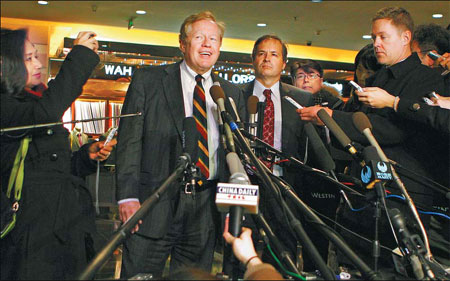
Washington and Pyongyang made progress on Wednesday during a meeting to discuss nutrition assistance, while cross-border relations between Pyongyang and Seoul remained strained.
The two sides "made progress", after they "discussed a number of the (nutrition assistance) issues", Robert King, the US envoy on human rights in the Democratic People's Republic of Korea, said after the talks in Beijing with the delegation from Pyongyang.
 |
|
Robert King, US Special envoy on human rights in the Democratic Republic of Korea, meets with journalists at a hotel in Beijing on Wednesday. The two sides are scheduled to meet again on Thursday. [Zhu Xingxin / China Daily] |
King's counterpart was deputy director general of the North American Affairs Bureau of Pyongyang's foreign ministry, said Yonhap News.
"We had two very good sessions today we'll still have issues to resolve and will be meeting tomorrow to deal with those issues," he told reporters at his hotel.
He said the nutrition assistance program was complicated, and refused to provide more details about the talks.
In a short briefing on Wednesday morning, King said the US looked forward to helping pregnant women, nursing mothers, young children and the elderly in the DPRK through the nutrition assistance program.
"We need to work out the details," said King, adding that the US needs to ensure that the program will proceed without any problems and that the assistance will reach those who need help.
The talks came after the DPRK announced on Feb 29 that it would suspend its nuclear tests, long-range missile launches and uranium enrichment activity as agreed two weeks ago during high-level talks with the US in Beijing.
Pyongyang also agreed on the return of UN inspectors to verify and monitor the suspension of uranium enrichment activities at Yongbyon and confirm the disablement of the 5 megawatt reactor and associated facilities.
In return, the US agreed to finalize plans with the DPRK to provide 240,000 tons of nutritional assistance for women and children.
"The DPRK attempts to make achievements in bilateral communication with the US and maintain the sound interaction so that the US can admit it as a nuclear nation eventually," said Zhang Liangui, an expert on Korean Studies at Party School of Central Committee of Communist Party of China.
Pyongyang also hopes that the two countries can establish diplomatic relations in the future, he added.
The DPRK might not really need the food assistance, Zhang said.
The purpose may have been to show its goodwill to the US and to tell Washington that Pyongyang's policies are flexible, so that the bilateral exchanges could continue, Zhang said.
Meanwhile, Kim Kwan-jin, defense minister from the ROK, on Wednesday reiterated his vow of retaliation against the DPRK in the event of any provocation.
If provoked, the ROK should automatically and powerfully respond "until the enemy surrenders", Kim told troops based on Yeonpyeong island, ROK media reported.
You may contact the writer at zhouwa@chinadaily.com.cn.